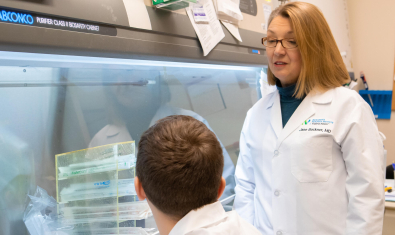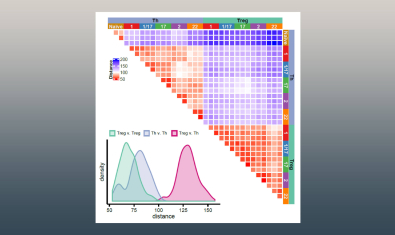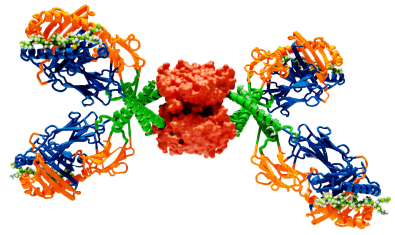Multiple Sclerosis: Disease Overview
Multiple sclerosis (MS) affects about one in 1,000 Americans and is twice as common in the Northwest, where approximately two in 1,000 people live with MS. While there currently is no cure for MS, scientists at BRI are finding better ways to diagnose and treat it, as well as understand how and why it happens.
Clinical trials are underway to see if drugs that selectively adjust the immune system can reduce MS symptoms better than current treatments. Proteins discovered at BRI are being studied by our scientists to see if they can be used to measure disease activity and as potential targets for new therapies. BRI scientists and their colleagues have also discovered a type of immune system cell that they believe is instrumental in tipping off the biological processes that lead to MS and other autoimmune diseases. They are studying these cells to figure out how to slow or even stop these processes.
What Is Multiple Sclerosis?
Multiple sclerosis (MS) is an autoimmune disease in which the body’s immune system mistakenly attacks the fatty substance (called the myelin) that surrounds and protects the nerve fibers in the brain and spinal column (also known as the central nervous system).
Sometimes, MS is progressive, which means the symptoms get worse over time. Other people have relapsing-remitting MS, which means they have periods where their symptoms get worse and then improve.
What Causes Multiple Sclerosis?
We're still not sure. Scientists think a combination of genetic factors and environmental triggers, like viruses, may cause multiple sclerosis (MS) to begin. BRI Director of Academic Affairs Steve Ziegler, PhD, is researching whether an individual's genetic code controls the development of MS. Estelle Bettelli, PhD, is working to identify the cells and processes that drive the development of MS and other autoimmune diseases.
What Are Risk Factors for Multiple Sclerosis?
- Geographical location – People who live farther from the equator are more likely to develop multiple sclerosis (MS).
- Sex – Women are two to three times more likely to develop MS than men.
- Age – MS is usually diagnosed between the ages of 20-50.
- Genes – Though MS is not an inherited disease, about 200 genes have been identified that each contribute to the risk of developing MS.
- Ethnicity – MS is most common among white people of northern European descent, though it also occurs in almost every ethnic group.
- Low vitamin D levels
- Smoking
- Excess weight
What Are the Signs and Symptoms of Multiple Sclerosis?
- Numbness
- Fatigue
- Dizziness
- Paralysis
- Loss of vision
The signs and symptoms of multiple sclerosis vary significantly from one person to another and depend on the location and severity of damage to the nerve fibers.
What Is the Latest Research Into Multiple Sclerosis?
Scientists at BRI are working to understand the cells and processes that cause multiple sclerosis. Our research includes:
- Identifying the cells and processes that cause multiple sclerosis (MS).
- Understanding why Tregs (the regulatory T cells that usually keep the immune system in check) don’t work properly in MS.
- Finding ways to slow down the progression of MS.
- Developing models that allow scientists to better study progressive MS.
Labs Studying Multiple Sclerosis

Bettelli Lab
The main focus of the Bettelli Lab is to identify the cell types of the immune system and mechanisms, which induce and regulate the development of autoimmunity.

Buckner Lab
The Buckner Lab is focused on identifying the underlying mechanisms by which regulation of the adaptive immune response fails or is overcome in the setting of human autoimmunity.

Campbell Lab
The Campbell laboratory is interested in understanding the basis for T cell activation, function and tolerance.

Kwok Lab
The Kwok lab uses tetramers and other antigen specific T cell assays to examine autoreactive T cells in autoimmune diseases in order to provide insights into disease mechanisms and identify strategies for disease intervention.
Clinical Research Studies in Neurosciences and Spine
We have ongoing clinical studies in several areas of neuroscience and neurosurgery. Studies labeled as “Enrolling” are actively recruiting new participants while studies labeled as “Closed to Enrollment” are still active but no longer seeking new participants.
Please email the Neurosciences and Spine Clinical Research Team or call (206) 287-6260 for more information.
- Amyotrophic lateral sclerosis (ALS)
Prospective Evaluation of DVT Incidence and Risk Factors in Patients with ALS: A Pilot Study
Principal Investigator: Xuan Wu, MD
Status: Enrolling- Multiple Sclerosis (MS)
A randomized, double-blind, double-dummy, parallel-group study, comparing the efficacy and safety of remibrutinib versus teriflunomide in participants with relapsing multiple sclerosis, followed by extended treatment with open-label remibrutinib
Principal Investigator: Mariko Kita, MD
Status: Enrolling- Neurosurgery
A Prospective, Blinded, Controlled, Dose-Randomized Clinical Investigation of OsteoAdapt SP In Single-level Transforaminal Lumbar Interbody Fusion (TLIF) For The Treatment Of Symptomatic Degenerative Disease Of The Lumbosacral Spine
Principal Investigator: Philip Louie, MD
Status: EnrollingMedtronic Product Surveillance Registry
Principal Investigator: Farrokh Farrokhi, MD
Status: Enrolling





